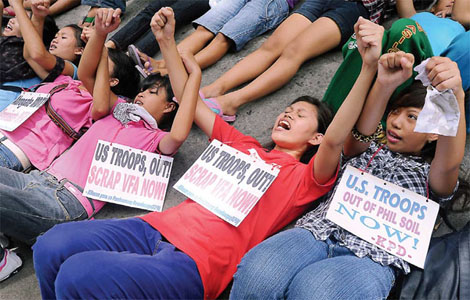Manila set to dispatch envoys to Beijing
Updated: 2012-05-18 02:59
By Li Xiaokun (China Daily)
|
||||||||
|
 The docking of a US submarine in a Philippine port led to a student protest near the US embassy in Manila on Thursday. The USS North Carolina docked in Subic Bay, north of Manila, on Tuesday. Subic Bay is close to Huangyan Island. The protesters are calling on the US to keep away from the area. [Photo by Jay Directo / Agence France-Presse] |
Move reflects desire to ease tension over island standoff, experts say.
Manila will dispatch two special envoys to Beijing amid a tense standoff in the South China Sea following the harassment of Chinese fishermen in territorial waters.
Beijing issued an immediate response on Thursday saying that it noted Manila's "attitude".
Chinese experts said that dispatching the envoys, given that the Philippines has not had any ambassadorial representation in China for more than a year, reflects Manila's desire to ease the crisis.
Sending the envoys, confirmed by Malacanang Palace in Manila on Thursday, is in sharp contrast with Manila suspending diplomatic dialogue with Beijing in late April.
Former Philippine ambassador-designate to China, Domingo Lee and Cesar Zalamea, chairman and chief executive officer of Focus Range International, are the envoys.
Philippine President Benigno Aquino, who is in the process of selecting a new ambassador to China, signed the appointment papers on May 10 for a term of six months, the palace said.
The palace said Lee will "closely coordinate with, and provide regular feedback on, initiatives undertaken" to the ambassador, once an appointment is made, and to the Department of Foreign Affairs assistant secretary for Asian and Pacific Affairs.
He was also directed to promote 2012-13 as years of friendly exchange between the two countries.
As the special envoy for investments, Zalamea will "aggressively encourage more Chinese investors to locate and set up in the Philippines in preferred areas of investment as well as new and emerging areas for growth".
"We need envoys to help us along. (China) is a vast country, you need people to specialize for instance, on attracting investors," presidential spokesman Edwin Lacierda said on Thursday. "We have cultural exchanges, we have business, we have tourism ... and we would like to explore all avenues of our relationship not just focus on the contentious one," he added, referring to the dispute over Huangyan Island.
An official at the Philippine embassy in Beijing said they did not know the exact date that the two envoys would arrive in China.
"We have noticed the Philippines' attitude of attaching importance to bilateral relations," Foreign Ministry spokesman Hong Lei told reporters on Thursday.
"We expect the Philippines to take tangible steps to create a necessary atmosphere and good environment to protect bilateral cooperation," Hong said.
Philippine Foreign Affairs Secretary Albert del Rosario also said on Wednesday he expected the territorial dispute to be settled early.
The dispute was harming commercial ties. Tourism numbers, for instance, were falling, a point noted by a leading analyst.
"We should notice that the appointments came as the recent dispute between the Philippines and China over Huangyan Island began to hamper trade and diplomatic ties," Chen Qinghong, a researcher on Filipino studies with the China Institutes of Contemporary International Relations, said.
On April 10, a Philippine warship harassed 12 Chinese fishing vessels that had sailed near Huangyan Island, in Chinese territorial waters, in the South China Sea to seek shelter from a storm.
Manila is sending officials and experts from the Bureau of Plant Industry to Beijing next week to check on exported bananas deemed unfit for sale due to infestation.
Philippine fruit exporters have incurred losses of around $33.6 million since the standoff, local reports said. Both governments have said that this is not a political problem but a technical one.
"The Philippines has realized the disadvantage of not having an ambassador in Beijing," Chen said.
Jin Canrong, deputy dean of the School of International Studies at Renmin University of China, said "apparently the Philippines wants to ease tensions".
You can contact the writer at lixiaokun@chinadaily.com.cn.
 Relief reaches isolated village
Relief reaches isolated village
 Rainfall poses new threats to quake-hit region
Rainfall poses new threats to quake-hit region
 Funerals begin for Boston bombing victims
Funerals begin for Boston bombing victims
 Quake takeaway from China's Air Force
Quake takeaway from China's Air Force
 Obama celebrates young inventors at science fair
Obama celebrates young inventors at science fair
 Earth Day marked around the world
Earth Day marked around the world
 Volunteer team helping students find sense of normalcy
Volunteer team helping students find sense of normalcy
 Ethnic groups quick to join rescue efforts
Ethnic groups quick to join rescue efforts
Most Viewed
Editor's Picks

|

|

|

|

|

|
Today's Top News
Health new priority for quake zone
Xi meets US top military officer
Japan's boats driven out of Diaoyu
China mulls online shopping legislation
Bird flu death toll rises to 22
Putin appoints new ambassador to China
Japanese ships blocked from Diaoyu Islands
Inspired by Guan, more Chinese pick up golf
US Weekly

|

|






